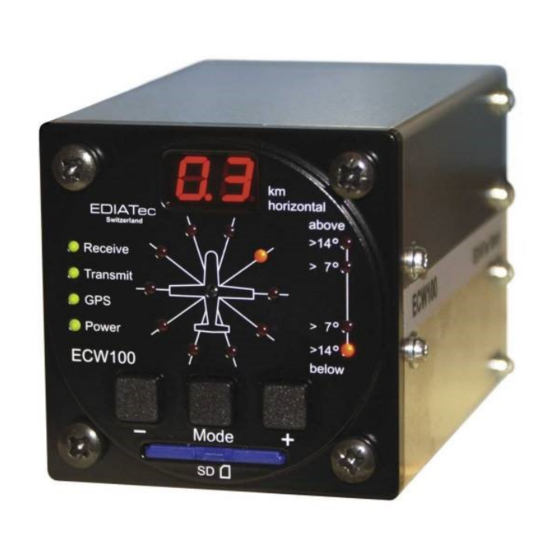Table of Contents
Advertisement
Quick Links
Entwicklung, Design und Herstellung von mechanischen und elektronischen
Komponenten im Bereich Industrie, Aviatik und Dienstleistungswesen
Installation Manual
ECW100 Collision Warning Unit
Status
Hardware version 1.1
(V 1.6 / July 2020)
© 2004-2020 EDIATec GmbH
Switzerland
www.ediatec.ch
info@ediatec.ch
Advertisement
Table of Contents

Summary of Contents for EDIATec ECW100
- Page 1 Entwicklung, Design und Herstellung von mechanischen und elektronischen Komponenten im Bereich Industrie, Aviatik und Dienstleistungswesen Installation Manual ECW100 Collision Warning Unit Status Hardware version 1.1 (V 1.6 / July 2020) © 2004-2020 EDIATec GmbH Switzerland www.ediatec.ch info@ediatec.ch...
- Page 2 Sport flying is an activity that is associated with considerable risks for crew, passengers, third parties and other objects. In order to make full and safe use of ECW100, it is absolutely essential to be fully aware of the risks, operating conditions, restrictions and limitations associated with the use of ECW100.
-
Page 3: How It Works
A pressure sensor further enhances the accuracy of position measurements. The predicted flight path of a first aircraft — in which ECW100 is installed — is calculated by ECW100 and the information transmitted by radio, as a low power digital burst signal at one-second intervals. -
Page 4: General Advice On Installation
European Commission Regulation (EC) No 1702/2003 must be respected. ECW100 must be secured in such a position that the pilot has the display LEDs in direct view, and can hear the acoustic warning tone and operate the control buttons. ECW100 must not obstruct the piloting operation and in particular it must not hinder his field of view. - Page 5 5. Housing The front of the housing has fore threads, so that ECW100 can easily be secured by fore M4 screws (no more than 10 mm long). On the rear side there are two distance holders on the D-Sub-15 Connector. Do not remove these distance holders.
- Page 6 7. Power/Data The cable kid with a D-Sub-15 connector "power/data" is to lock in place. The key to the connections is defined by the numbers on the connector: Color Power/Data Remarks +8 .. +26 V DC +8 .. +26 V DC Power line GPS test (Pin 1 and 2, Pin 4 and 5 are wired together...
- Page 7 This might be necessary if the pilot suspects that ECW100 may be interfering with another on-board system, the suspected presence of smoke, the smell of smoke, or flying in a country where the use of ECW100 is not permitted.
-
Page 8: Wiring Schematics
The standard cable set includes the two power lines (red, black). Optional cables and connectors can be ordered by your dealer. 7.5.1. Power and Intercom 7.5.3. External display C/B 1A T Switch ECW100 D-Sub 15 (m) 8 .. 26 VDC Non-essential Bus ECW100 D-Sub 15 (m) - Page 9 If the aircraft is fitted with two or more GPS antennae, they should be separated if possible by at least 25 cm; the same holds good for ECW100 radio antennae.
-
Page 10: Radio Antenna
9. Radio Antenna The radio antenna is required for operation of ECW100. It's an external λ/2 dipole antenna with 3 m cable (50 RG-174U on conventional SMA), for internal or external installation. The correct installation has a considerable effect upon range for transmitter/receiver range, so the installation must be carefully considered. -
Page 11: Sound Signal
Canada. Likewise, operation of ECW100 is forbidden in aircraft in which one or more of the occupants resides in or is a citizen of the USA or Canada. Likewise, use of ECW100 is forbidden if the aircraft concerned takes off from, makes an intermediate or final landing in the USA or Canada. -
Page 12: Technical Drawing
12. Technical Drawing Page 12... -
Page 13: Technical Data
CE Mark. The radio conforms to the requirements of EN 300 220-3:2000 (Power Class 9.The EMC conforms with EN 301 489-3:2002-08 for a Class 3 SRD Device (equipment type I). ECW100 is a Class 1 item of radio equipment as defined by R&TTE Directive. Thun, February 2007...


Need help?
Do you have a question about the ECW100 and is the answer not in the manual?
Questions and answers